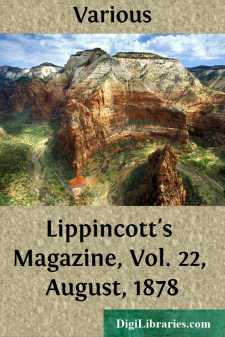Categories
- Antiques & Collectibles 13
- Architecture 36
- Art 48
- Bibles 22
- Biography & Autobiography 813
- Body, Mind & Spirit 142
- Business & Economics 28
- Children's Books 17
- Children's Fiction 14
- Computers 4
- Cooking 94
- Crafts & Hobbies 4
- Drama 346
- Education 46
- Family & Relationships 57
- Fiction 11829
- Games 19
- Gardening 17
- Health & Fitness 34
- History 1377
- House & Home 1
- Humor 147
- Juvenile Fiction 1873
- Juvenile Nonfiction 202
- Language Arts & Disciplines 88
- Law 16
- Literary Collections 686
- Literary Criticism 179
- Mathematics 13
- Medical 41
- Music 40
- Nature 179
- Non-Classifiable 1768
- Performing Arts 7
- Periodicals 1453
- Philosophy 64
- Photography 2
- Poetry 896
- Political Science 203
- Psychology 42
- Reference 154
- Religion 513
- Science 126
- Self-Help 84
- Social Science 81
- Sports & Recreation 34
- Study Aids 3
- Technology & Engineering 59
- Transportation 23
- Travel 463
- True Crime 29
Lippincott's Magazine, Vol. 22, August, 1878
by: Various
Description:
Excerpt
SOMENDRIA.
Ada-Kalé is a Turkish fortress which seems to spring directly from the bosom of the Danube at a point where three curious and quarrelsome races come into contact, and where the Ottoman thought it necessary to have a foothold even in times of profound peace. To the traveller from Western Europe no spectacle on the way to Constantinople was so impressive as this ancient and picturesque fortification, suddenly affronting the vision with its odd walls, its minarets, its red-capped sentries, and the yellow sinister faces peering from balconies suspended above the current. It was the first glimpse of the Orient which one obtained; it appropriately introduced one to a domain which is governed by sword and gun; and it was a pretty spot of color in the midst of the severe and rather solemn scenery of the Danubian stream. Ada-Kalé is to be razed to the water's edge—so, at least, the treaty between Russia and Turkey has ordained—and the Servian mountaineers will no longer see the Crescent flag flying within rifle-shot of the crags from which, by their heroic devotion in unequal battle, they long ago banished it.
The Turks occupying this fortress during the recent war evidently relied upon Fate for their protection, for the walls of[page 138] Ada-Kalé are within a stone's throw of the Roumanian shore, and every Mussulman in the place could have been captured in twenty minutes. I passed by there one morning on the road from Orsova, on the frontier of Hungary, to Bucharest, and was somewhat amused to see an elderly Turk seated in a small boat near the Roumanian bank fishing. Behind him were two soldiers, who served as oarsmen, and rowed him gently from point to point when he gave the signal. Scarcely six hundred feet from him stood a Wallachian sentry, watching his movements in lazy, indifferent fashion. And this was at the moment that the Turks were bombarding Kalafat in Roumania from Widdin on the Bulgarian side of the Danube! Such a spectacle could be witnessed nowhere save in this land, "where it is always afternoon," where people at times seem to suspend respiration because they are too idle to breathe, and where even a dog will protest if you ask him to move quickly out of your path. The old Turk doubtless fished in silence and calm until the end of the war, for I never heard of the removal of either himself or his companions.
The journeys by river and by rail from Lower Roumania to the romantic and broken country surrounding Orsova are extremely interesting. The Danube-stretches of shimmering water among the reedy lowlands—where the only sign of life is a quaint craft painted with gaudy colors becalmed in some nook, or a guardhouse built on piles driven into the mud—are perhaps a trifle monotonous, but one has only to turn from them to the people who come on board the steamer to have a rich fund of enjoyment. Nowhere are types so abundant and various as on the routes of travel between Bucharest and Rustchuk, or Pesth and Belgrade. Every complexion, an extraordinary piquancy and variety of costume, and a bewildering array of languages and dialects, are set before the careful observer....












